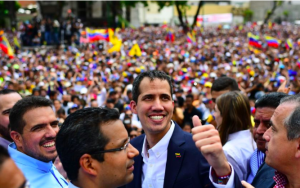On September 23, 2019, numerous Latin American leaders – under pressure from the United States – cited the Inter-American Treaty of Reciprocal Assistance to impose sanctions on Venezuela. The Treaty recognizes threats against one member country as a threat to all others, and members argued that the socio-economic instability of Venezuela posed a security threat to the entire South American continent. The Colombian government is particularly vocal about this, as president Ivan Durque accused the neighboring country of harboring dissident guerilla fighters seeking to dismantle his administration.
The United States’ current Secretary of State, Mike Pomeo, declared his intention to use the Treaty as a means of ousting Venezuela’s current president, Nicolás Madero. They would then replace him with Juan Guaido, who many countries including the United States recognize as the country’s legitimate ruler. The United States, under the Trump administration, has already imposed sanctions on the country like Barack Obama before him, and its recent efforts are aimed towards using their influence in Latin America to pressure its countries to do likewise.
Treaty members like Colombia claim the government under Madero eroded the democratic norms and institutions the country once had. The United States and the Lima Group – an alliance of Latin American nations centered on Venezuelan foreign policy – are currently working with think tanks and Venezuelan opposition groups to establish a Guadio-led government.
Overall, I felt the article disproportionately represented Lima Group figures, which means there is no plurality or diversity in the Venezuelan figures discussed. This is a glaring flaw because a lot of the rhetoric around regime change in the country centers on the lack of agency and basic resources like food under the current government. People who might, perhaps, at least frame this in a different context are not even discussed and – seemingly – not reached out to. It does not discuss how or why Guardio is considered by so many countries to be the official president, or what his solutions to the multi-faceted crises would be.
The article is not lacking in nuance, however, as it connects these sanctions to the already-prevalent instability of the Venezuela state, suggesting – if not explicitly stating – that these policies could further destabilize the country. It also discussed Cuba being an ally to the country – which reminded me of the various embargoes the United States has placed on Cuba over the last six decades. The various failed coup d’etats reminded me of the botched Bay of Pigs invasion during the Kennedy administration, and this connection also made me wonder whether the figures, both American and Latin American, given representation in the article have any material investment in ousting Madero. One likely can make these connections if the reader was thinking about them beforehand. This undeniably makes the article interesting, but had I not delved into it with this framework, I feel like I would have little more than basic knowledge about the sociopolitical crisis in Venezuela from an overly-American perspective.
Bibliography
Wilkinson, Tracy. “At Trump’s urging, Latin American countries set to invoke rarely used treaty against Venezuela” Los Angeles Times. September, 2019. Accessed 23 September, 2019. https://www.latimes.com/world-nation/story/2019-09-23/trump-south-american-countries-treaty-against-venezuela

